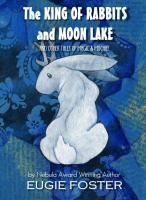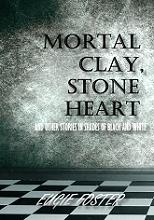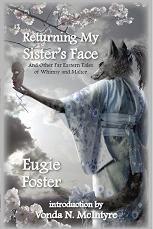I’m just in a pissy mood today. It seems like little things are all conspiring to irritate me.
My wing stubs hurt so I’ve been taking Clonazepam every night for the last several nights. Wonder if that could be contributing to my overall state of irritation?
The day started out poorly. My security clearance to READ from a database table I’ve been testing on at work disappeared, poof. I had it yesterday. When I came in this morning, it was gone (as it was from all of my project team members). So instead of finishing up my testing, I spent the morning getting my stupid clearance restored. God, it wasn’t even UPDATE access! I just wanted to perform SELECTs off the stupid table.
Then I had to go to a doctor’s appointment, a worker’s comp. related one for my TOS so I couldn’t skip it or reschedule it. It was in town. There was much rush-hour traffic fighting. I hate driving in rush-hour. And I got totally turned around in town and had to doubleback several times.

Writing Stuff:
I read today’s critiques from Critters. To be fair, most of the critiques I’m getting are both positive and respect my author’s notes comments.
My two offerings are a pair of folk tales for children. I plan to send them to Cricket, which has a target age range of 9-14, so I gave approx. ages as my target audience in my author’s notes. But I only provided this info as an FYI so people don’t go “these stories are awfully simplistic, you should consider submitting these to children’s markets.”
But okay, while I’d hardly claim to be an expert on children’s lit., thus far I’ve sold three stories to Cricket and one to each of their other magazines with age ranges above and below Cricket‘s (Cicada: 14+ and Spider: 6-9) . I’ve also got a Master’s degree in Developmental Psychology and have co-authored a Child Development textbook. So I’m pretty secure in my writer’s instincts regarding how I handle various age levels. Ergo, I don’t want comments on whether my writing is age appropriate.
I state this very plainly in my author’s notes. I sez:
“I’m *not* looking for people’s thoughts regarding whether these are age appropriate.”
And, while I expected one or two people to comment anyway, here are snippets from three out of the four crits I got today:
Critique 1:
“while reading I noted some words that nine to twelve year olds might not understand. Some of these are exasperation, bemused, fickle, luminous, swaddling, and crystalline.”
Critique 2:
“However, I question the reading level of the words you have chosen. I know that 9-12 year olds have a wide range of reading levels, but it might be best if you ran the story through some kind of online service to test the reading level”
Critique 3:
“it’s been a long time since I was 9-12, but I don’t think they would have appealed to me at that age . . . I’d say aim more 6-9.”
I’m less irritated with this one as it’s more along the lines of “I don’t think I would have liked it” which is a perfectly valid opinion. But still . . . ![]()
I know, I know, I get what I pay for. Critters is free. I’m not paying anyone for these. But it really bothers me when people underestimate children and thereby perpetuate the appalling state of literacy in this country. Suggesting that words like “exasperation” and “fickle” should be removed from a story because a child might not understand them undermines basic vocabulary learning. How will children learn new words unless they are exposed to them? (And hell, the fact that this critter–i.e. aspiring writer–thought these were “hard” words for pre-teens is just disgraceful.)
Young children are primed to acquire language skills. Children as young as 18 months have the ability to “fast map” new vocabulary words after a single exposure to it. I wish I could still do that, but unfortunately it’s long gone by adulthood. When well-meaning adults advocate “writing down” to children, it does them a grave disservice.
We need to challenge children, not hold them back, dammit!









good grief, what did they read at 10, see jane run? I was reading Ian Fleming and John D. McDonald, Robert Heinlien and Isaac Asimov among many others. I never knew what “childrens literature” was once I got past the “see jane” stuff.
I know! Damn, I was reading Shakespeare at that age. Underestimating children is a pet peeve of mine. I hated, absolutely hated it when adults withheld information from me on the grounds that “I was too young to understand.”
“while reading I noted some words that nine to twelve year olds might not understand. Some of these are exasperation, bemused, fickle, luminous, swaddling, and crystalline.”
Screw THAT. I knew what all of those words meant in that age group, and if I *hadn’t,* well, I’d been trained to go get a dictionary and look them up.
I think that some folks don’t remember that by the time you hit 8, you are being trained to actively learn for yourself. nobody expects a kid to build a particle accelerator, but I had a dictionary, and it was well-thumbed by the time I was ten.
and besides, there’s always, “Mom, what’s luminous mean?”
Gah. And I suppose I didn’t understand any of Lord of the Rings, or any of the witchworld series.
Come to think of it, most of my favorite “childrens” authors either weren’t, or really challenged me. Dianna wynne jones, lloyd alexander, susan cooper..
Same here! I was bored to tears by the pre-teen pap that was considered appropriate reading for that age and went straight to the Heinlein, Bradbury, and Tanith Lee.
*g* an excellent choice.
Why do you have wingstubs, and why are they hurting?
Oh, heh. I’ve got an extra set of ribs in my neck. The doctor today called them “nubs.” I’m sure that’s an official medical term . . .
Anyway, they press on my thoracic outlet nerve (a condition known as “Thoracic Outlet Syndrome”) when I overuse my hands–i.e. when I type or mouse–and cause tingling, numbness, and pain. When I was first diagnosed with this, that is when they took the x-rays and pointed out my extra ribs, Matthew and I started debating whether I was sprouting wings or Cthulu tentacles. The jury is still out, but I typically just call them wing stubs.
I’ve been wondering lately if it’s a crescendoing trend to treat children as fragile dimwits who need to be coddled and cosseted rather than challenged, or if it’s just that I’m more aware of it. It seems like I see people who want to “protect” children from something–typically literary or otherwise artistic–everywhere I look. It’s irksome is what it is.
(Waves) I’m a lurker to your journal, a writer of young adult fiction and a soon-to-be first-time mom.
“I’ve been wondering lately if it’s a crescendoing trend to treat children as fragile dimwits who need to be coddled and cosseted rather than challenged…”
From what I’m seeing, yes. I’m even more aware of it now, when I’m being exposed to other “mommies” who believe the precious little ones need to be protected from everything from the napkin drawer to defeat on the soccer field. So it was a delicious treat this week to pick up “The Three Martini Playdate,” which has chapters like “Saying No to Your Kids: It’s a Kick!” “Screaming, is it Necessary?” and “Children’s Music: Why?”
On a more writerly note, I recently had my critique group look at a draft of a novel I’m finishing for teenaged girls. They took issue with the language as well, and they wondered if the structure might not be too sophisticated. Considering that, by 15, I was reading things off my parents’ bookshelves and shunning anything that had a pink paperback cover with a lipglossed model on it, my response was, “no, these girls aren’t idiots. Now what do you think of the *story?*”
“while reading I noted some words that nine to twelve year olds might not understand. Some of these are exasperation, bemused, fickle, luminous, swaddling, and crystalline.”
My ten year old knows all those words. She knew them at 9, too. I’m guessing those folks aren’t parents of preteens.
I’d certainly hope not. If they are, then they have a really inaccurate impression of what their children are truly capable of.
Young children are primed to acquire language skills. Children as young as 18 months have the ability to “fast map” new vocabulary words after a single exposure to it. I wish I could still do that, but unfortunately it’s long gone by adulthood. When well-meaning adults advocate “writing down” to children, it does them a grave disservice.
We need to challenge children, not hold them back, dammit!
PREACH IT, SISTER! Right on!
Amen!
Heck, I knew words like tertiary and paraphernalia by grade two or three — good old comic books!
And I know people my age or older who don’t know some of those words. Does that mean it’s age-inappropriate for 20-somethings too? 🙂
That being said, the last comment seems to be saying the opposite of the others: that s/he felt the stories better suited to 6-9 than to 9-12 (or 9-14, or whatever.) Which is interesting.
“the last comment seems to be saying the opposite of the others: that s/he felt the stories better suited to 6-9 than to 9-12 (or 9-14, or whatever.) Which is interesting.“
When I’ve asked for age level comments in the past, I always got contradictory opinions which meant I ignored them and just went with my own instincts, so I stopped asking for them. But I still got ’em. This time I specifically requested people not comment regarding age level, and yet . . .
Although I find complaints that my writing level is too simplistic rather than too sophisticated far less annoying.
“Heck, I knew words like tertiary and paraphernalia by grade two or three — good old comic books!”
Comics, huh? It was Dungeons & Dragons for me. Whatever else you can say about Gary Gygax’s writing, the man was a serious boon to my vocabulary. 🙂
I have wondered before if kids into Fantasy and SF are exposed to a wider vocabulary than the average child. Like the nurse today–an adult, educated woman–didn’t know what the word “brothel” meant. (Don’t ask how the word “brothel” came up at an orthopedic appointment.) It would never have occurred to me that “brothel” would be a difficult word for anyone.
That’s cetainly possible. I think it might be more accurate, however, to say that kids into reading are exposed to a wider vocabulary than the average child–the “average” child, unfortunately, not being all that mucn into reading these days. :-/
Very true.
You might have hit upon something here. My boss, who is an intelligent woman with a Master’s degree in English, was telling me about the movie Troy. She started asking me what happened to the characters after the fall of Troy, making the comment, “You would know — you like all those fantasy books.”
Uh, yeah. But how could an English major not know The Illiad?
Now that’s just appalling. I find I’m not shocked or even surprised, though. Such is the state of literacy in America.
“You would know — you like all those fantasy books.”
Uh, yeah. But how could an English major not know The Illiad?
::facepalm:: I weep for the future.
good lord. here’s an idea: if the little asshats don’t understand a word, perhaps they could wander over to ye olde dictionary and *gasp* look it up. it’s called building vocabulary…and really, kids these days seem to be getting stupider, so perhaps we should encourage such activities.
grumble…
Everyone else has said it better than I could – but as someone who read Lord of the Rings at 7 and as the mother of two daughters who are both avid readers (one aged 9, one aged 11) I can certainly say that your critics have very little idea of the actual reading capabilities of children that age and are almost certainly not parents themselves.
I mean, come on! Difficulties with words such as exasperation, bemused, fickle, luminous, swaddling, and crystalline? Not if they’ve read Harry Potter, for starters – and how few children are there that haven’t? And after all, that’s what a dictionary is for.